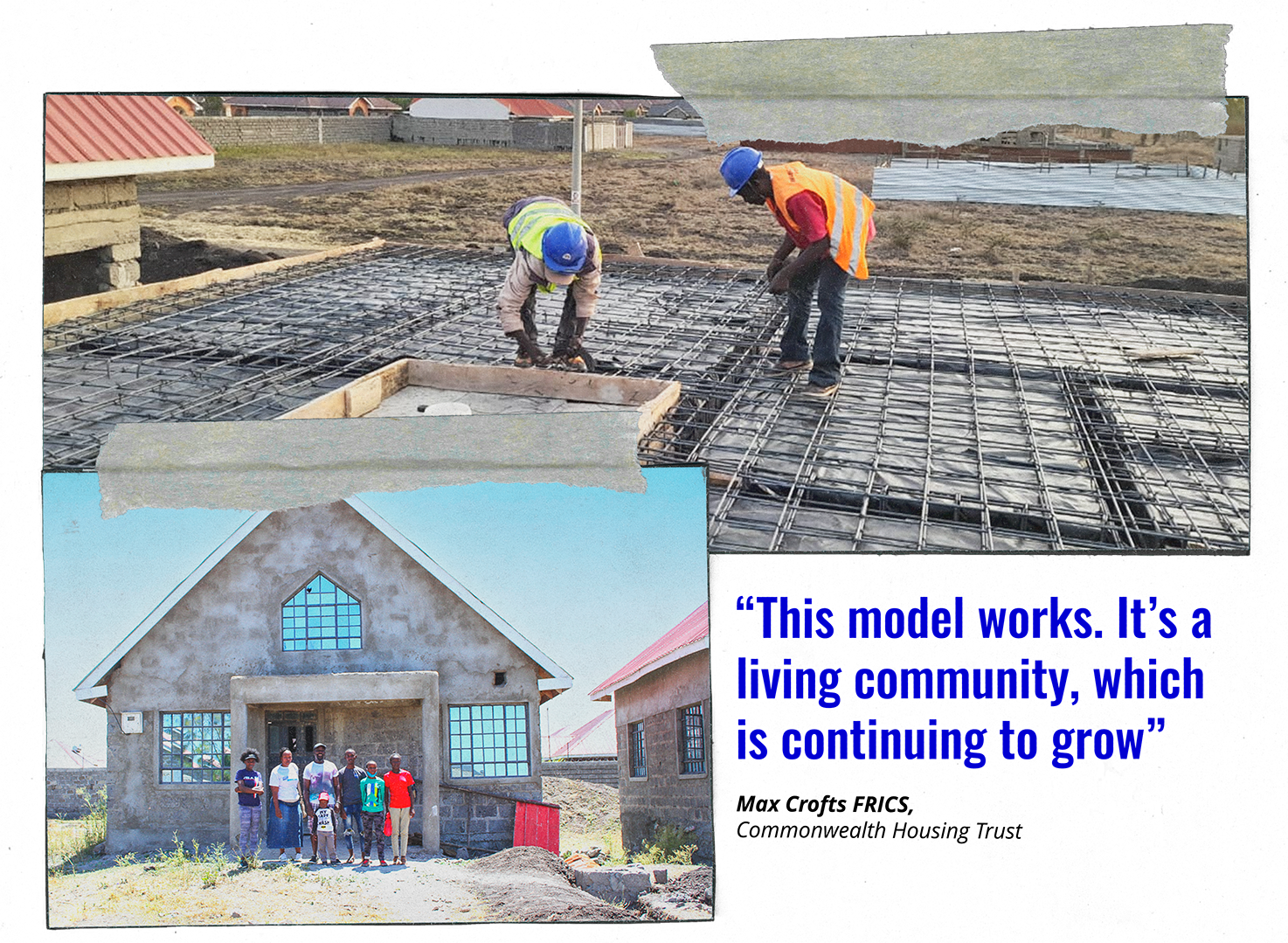
Raising four children as a widowed mother is no easy task. Now imagine doing so in a Nairobi slum, living in a single room mud-and-plaster house with only a corrugated tin roof to protect from the elements.
The rent is due daily, with eviction possible at any time for nonpayment. Worse yet, the crowded alleys lined with other rental shacks sit downwind from noxious fumes at Africa’s largest landfill.
These are the conditions in which Anastacia Nthenya found herself as a resident of Korogocho, Nairobi’s fourth-largest slum and home to some 200,000 people crammed into a single square mile. But her dire circumstances took a turn for the better when she moved into a new three-bedroom house, paying 2,000 Kenyan shillings (£11.80) per month — the minimum cost to rent a 3m2 hut in Korogocho.
How did Nthenya pull off this dramatic improvement in her family’s living conditions?
The Commonwealth Housing Trust is a charitable organisation founded by RICS Past President Clifford Dann in 2002. It secured a two-acre plot of land with legal tenure, with the goal of building quality of housing available for rent at an affordable price for families willing to contribute their labour to construction. Thanks to the dedicated work of surveyors volunteering their talents in both the UK and Kenya, today planning permission has been granted for 25 homes and 12 have been built so far, including Nthenya’s.
“As a mother I’m so excited because the house is big and spacious,” said Nthenya. “I can start a kitchen garden or a business. The girls will grow up in a clean environment that is not toxic and it will give them an opportunity to become respectable people in society.”
Nythena was offered a house because her husband was among the 25 families who formed a self-help group called Mwamko, a collection of Korogocho families from different tribes and religions united by a common cause.
“What holds us together is the need for shelter,” said Abdi Mohammed, property manager and himself a Mwamko member.
But making even this small dent in the global crisis of informal settlements and slum conditions in some parts of the world did not come easy.
Secure tenure
The scale of Nairobi’s informal housing problem is infamous. An estimated 2.5m people, some 60% of the city’s population, live in slums. Kibera is widely considered the largest slum in Africa and one of the biggest in the world.
In large part, slums are so prevalent because of clashing ideas about land.
“As part of the British empire, Western concepts of land ownership were shoehorned into a society that operated on communal or tribal land,” explains James Kavanagh MRICS, global director of land at RICS, who has worked on land and housing issues in Palestine, Syria and Egypt, among other places. “Those ideas didn’t quite fit into what you would consider a functioning land registry or market system.”
When Nairobi’s population boomed due to rural-to-urban migration while the postcolonial government was still getting on its feet, there was no orderly, well-functioning land market to accommodate new residential construction. Instead, squatters began building on tracts of government land – where they remain to this day.
These are the conditions that the Trust encountered when it began working in Nairobi with the goal of providing better housing after early rural housing efforts in Kenya and Sri Lanka. With the help of the Nairobi-based United Nations Human Settlements Programme (UN-Habitat), Trust co-founder Toby Kent was introduced to the Mwamko families and became convinced that they were committed to improving their lives. But building houses in or near Korogocho, where nearly all housing plots lack formal land title, wouldn’t work.
“Doing it ethically means acquiring title to the land,” says the Trust’s treasurer and former RICS President Max Crofts FRICS.
What’s more, proper title lessens the risk to the charity’s investment from land fraud or eviction claims.
As a result, finding a suitable plot of land with legal tenure became one of the Trust’s primary challenges. A weak property registry means that unscrupulous land sales are common. Some plots come with flimsy titles that can easily be challenged in court by so-called land grabbers who prey on vulnerable landowners.
In 2012, the Trust found a plot with solid title in Kamulu, some 27km away from Korogocho, for 4m Kenyan shillings (£30,000). As the prospect of a housing estate became more tangible, the Trust also established the Commonwealth Housing Group, a Kenyan-registered charity that owns the land and operates independently from, but in close consultation with, the UK-based Trust.

Self-building
Subdividing the land to build the houses provided another another challenge. Bureaucratic and procedural difficulties dragged that process out over four years. Finally, in 2020 the project was ready to clear the land and break ground with the help of a site engineer and RICS-qualified quantity surveyor.
A critical component of the Trust’s methodology is to teach building skills to residents. Their future homes are, in effect, self-built. The Trust arranges to train people from the different Mwamko families in skills like masonry, concrete, plumbing, electrical, painting, decoration and glasswork. The result is a three-bedroom, 112m2 house with room for a kitchen garden.
Constructing quality houses alone is not itself a solution, however. “As empowering as self-built projects can be, there is a need to consider governance and management of housing post-build,” says Louise Winterburn, deputy chief executive of global housing NGO World Habitat.
To that end, Mwamko, which has since been formally incorporated as a housing association, independently manages the housing allocation process by considering both need and contribution. All families must participate if they wish to receive a house, with the current expectation that one must contribute to a minimum of three houses before receiving one’s own.
Members in line for allocations can designate a beneficiary in the event of their death, as was Nthenya’s case. Mwakmo also stipulates that families must contribute 500 Kenyan shillings (£2.95) per month into a communal maintenance fund, though most common area maintenance is currently paid for by the Commonwealth Housing Group.
These mutually agreed-upon provisions help maintain social cohesion among the Mwakmo families and lay a strong foundation to ensure the housing scheme’s future success. As the land remains under the Group’s ownership, any given house that is vacated will remain affordably priced for the next family on the waiting list.

Although the families moved a considerable distance from Korogocho, most are optimistic about finding work and education opportunities close to Kamulu. For example, many families are vendors who buy products like shoes at wholesale and sell at retail prices. They are optimistic they can open a business nearby at the Kamulu shopping centre. Matatus, the shared vans that are the backbone of Nairobi’s informal transit network, also provide a reasonable commute for those who work in or near the city centre.
The benefits of moving away from squalid Korogocho far outweigh the costs. Squatters first pitched up in Korogocho in the 1960s on vacant public land some 11km from the city centre, then considered the outskirts of town. But rapid urbanisation ballooned the population, as well as swelled the size of the Dandora dumpsite and the amount of waste heading into the city’s main sewage treatment facility. Today, residents of Korogocho suffer health problems from this toxic brew – one of the main motivations for Mwamko members to escape the slum.
“When we moved away from Korogocho, my wife’s asthma problems went down and my family’s expenditure on health has reduced dramatically,” Mohammed says. “A better living environment makes everyone healthier.”
Surveyor’s role
While the pace of construction is slow, the results are a cohesive community.
“We can only work at the pace of the self-builders,” says Crofts. “But we are now at a point where we can say, this model works. It’s a living community, which is continuing to grow.”
Above all, the Trust’s engagement in Kenya proves the value that surveyors bring to the table when faced with some of the world’s most intractable challenges, as well as the utility of surveyors across the charitable sector more broadly.
“With an organisation like the Commonwealth Housing Trust, the need for specialists in land and construction is obvious,” said RICS President-Elect Justin Sullivan FRICS, a patron of the Trust. “However, many charities, from the small and local to the well-known and international, may need help with premises, property transactions or development plans. They may also benefit from our wider skills, for example in costing, analysis or contracts. By volunteering our time, we can help these charities to spend wisely and remain focused on their core purpose.”


